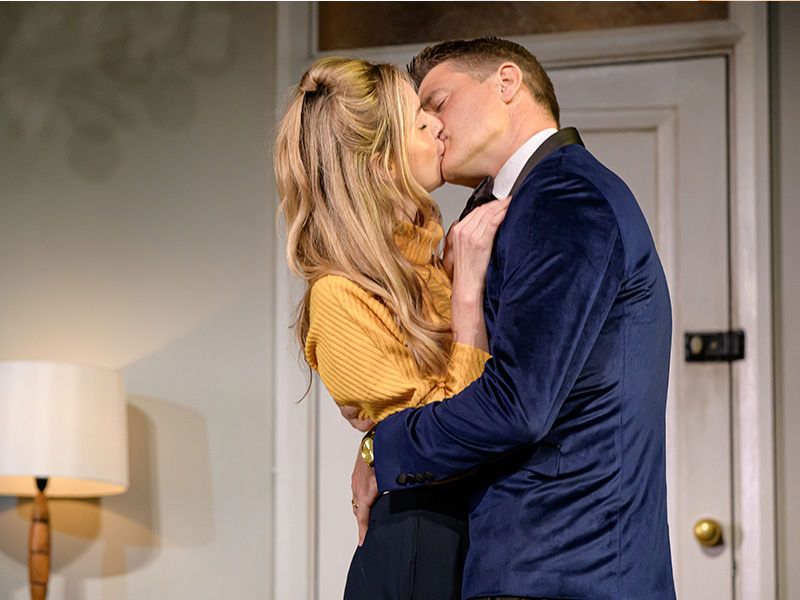REVIEW: Dial M for Murder at The Everyman Theatre

REVIEW: Dial M for Murder at the Everyman Theatre
The Everyman Theatre, Cheltenham
Monday, 11 October 2021
Rating: ★★★☆☆
Dial M for Murder isn’t a Whodunnit, a Howdunnit or even a Whydunnit. It’s more of a Hedunnit. The burning question is, will he-who-dunnit get his comeuppance?
Written in the ’50s, this popular thriller was first a BBC TV drama, then a West-End play, then a Hollywood movie. It has all the elements of film noir: an complex plot with an ingenious twist; a dastardly anti-hero (ex-tennis champion Tony Wendice); a shady accomplice (social chameleon Captain Lesgate); a dashing lover (crime writer Max Halliday); a dogged plod (Tony’s shadow-self, Inspector Hubbard); and a passive female (Tony’s wealthy wife and Max’s paramour Margot).
Dial M for Murder has been thrilling audiences for almost seventy years, and for good reason. Like the gears of a Rolls Royce, its narrative synchromesh is perfectly aligned. However, if it sometimes feels written-by-numbers that’s because, in a sense, it was. Back in 1952, Thriller-Writing For Dummies hadn’t been published (it still hasn’t), so wannabe-screenwriter Frederick Knott studied crime drama Ten Minute Alibi, by Anthony Armstrong, to teach himself the nuts and bolts of the genre. As a result, Dial M for Murder is not so much written as plotted; not so much a play as a deftly-coded theatrical algorithm.
A seventy-year-old genre piece is bound to creak a little. The scene-setting at the top of the play is laborious. The play is described as a psychological thriller, but I’m not so sure. According to his widow, Knott hated writing, and I think it shows. The play is gripping and suspenseful, but reveals little of the characters’ psychologies. Margot is a two-dimensional object of desire, whose only act of self-assertion flings her out of the frying pan into the fire. Tony has no moments of reflection or self-doubt. He’s just in it for the cash.
Getting an audience to root for the baddie isn’t particularly difficult – we all know who’s the star of the panto, and it ain’t Aladdin. By sharing with us the practical details of Tony’s evil plot, Knott initially gets us to sympathise with the villain. For me, the genius of the piece lies in the way that, when the thrill of murder-plotting passes and terrible, unforeseen consequences ensue, Knott reverses our sympathies in favour of Tony’s nemesis, Inspector Hubbard.
Under Anthony Banks’s tight direction, the cast sustain the narrative momentum with tremendous verve. Tom Chambers is a charmingly charismatic Tony – although his performance sometimes teeters on the brink of being a little too knowing. Christopher Harper doubles skilfully as louche Captain Lesgate and blunt northerner Inspector Hubbard, who reviewers can’t resist comparing to TV detective Columbo, so I won’t. Diana Vickers and Michael Salami (Margot and Max) both perform effectively, within the limitations of their supporting roles.
Banks has updated this production to 1963, the year before the last executions in the UK took place, which allows for cool decorative styling and plausible jeopardy. David Woodhead’s canted set, populated with mid-century furniture, cleverly invokes the sloping camera angles of film noir, a hat-tip to Hitchcock’s 1954 movie of the play.
Reviewers can’t resist hinting at the plot twist, and I’m no exception. However, unlike them, I’m not going to include any spoilers. Instead, I’m going to write the clue in ‘invisible ink’ on the line below. If you want to reveal it, highlight the space between the asterisks. You’re welcome.
*It all turns on the key*
I didn’t think this would be my sort of show, but I was gripped; I was breathless; I was wrong.
Running time: 2 hours 10 minutes (including interval)
Dial M for Murder runs at the Everyman Theatre, Cheltenham, until Saturday 16 October 2021.
Reviewer: Paul Sharples
Explore Gloucestershire
12 October 2021
For further information.
OTHER NEWS
